In my
last article I lamented the state of my finances and the horror of having to forgo what is clearly genius.
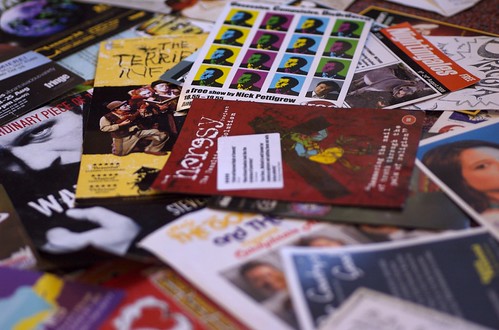
Fliers gathered on the Royal Mile -- most of them trying to entice you into giving away your budget for the week, but some dangle the magic word "free".
Thankfully there is something called The Free Fringe -- it is a little like Alexandraparken, for those who know the Jazz Festival in Molde, only spread out throughout the city and frequently indoors at pubs. It would appear to be some sort of rebellion directed at the prices for locales in this city during the Festival (quite justified, I'd say), and while you are not really supposed to see it without paying anything, that is quite possible. A dangerous strategy in Scotland, you might say, but there are a lot of foreigners here at the moment. I got Roh to come with me to several events, and here follows my account of
my/our experiences of the Free Fringe:
Grim:
This was the first show we saw. It was described as a "dark and twisted" version of four fairytales from the Brothers Grim collection. We were fairly agreed that the Grim fairytales are fairly dark and twisted to begin with, and also that we are rather sceptical of people who use expressions like "dark and twisted", but that when something is free there is a limit to how picky you can be. Our expectations, then, were not of the highest, but the show turned out to be rather good, and "dark and twisted" as a descriptor was really quite justified.
It told four stories, the first of which I couldn't quite place as a Grim story. It was also overly feminist and predictable. We began feeling that our low expectations were about right, and it was all rather sad -- I sat there thinking "oh, my: three more?". But then it got better. They used Hans and Gretel as a frame story, having them pick a new prop from their suitcase for each girl. The first was a yellow ribbon (and I really feel I should be able to connect that to a story, but I cannot). The next was an
amazing red raincoat; I confess I became rather too engrossed in the lovely raincoat and did not pay as much attention at the beginning of the second story as I might have, but the story was of course that of Little Red Riding Hood. Little Red Riding Hood was, however, transposed into a 14-yearold girl eager to work as a prostitute. The wolf was, of course, a customer. This was all an improvement on the first story, but still not what I would term challenging theatre. The following prop was a mirror, and the episode took its lead from Snow White, showing a girl with an eating disorder. A corset killing her, apples -- it was all there. This part was interesting, in part because of the performance, but the final story really was the best. Its prop was a shoe, and the story a twisted version of Cinderella.
Allow me to go into some detail: Cinderella (I think they used the German name), works for her stepmother in a funeral parlour, preparing the bodies. Upon the arrival of the body of a man named Paul, we are told that Cinderella had passed him in the street, their eyes had met, and that was all it took for her heart to be lost to him &c. Alone with the body, Cinderella relates that she does not think of him as a Paul, but as an Edward -- "rather more charming". She then goes on to postpone the funeral, winning two more hours with the body, and finally we see her, now with a glass jar containing a heart, thanking invisible funeral guests for coming to "Edward's" funeral, saying how sad it is that "Edward" is gone, but that at least she will have his heart forever. Wonderfully creepy play on words. I certainly enjoyed it. The frame story was also well rounded off with some failed sarcasm: "Have you left a trail so that we can find our way back?" "No, I have just been throwing candy on the floor now and then." "Oh, no, then how shall we get home?" "No, the candy is the trail for us to follow." And they leave.
Happy with this, we went to the bar to have a glass of wine and discuss how lucky we had been with our choice; and then we got shanghaied by this sad standup-comedian who wanted us to come upstairs to see the show. It struck me that we do not usually follow strange men up dark stairs, but you make exceptions in Festival times.
Mike O'Donovan & Hannah DunleavyWe should have stayed in the bar (which only had one bottle of red wine, and the bar tender seemed to think we should count ourselves lucky he had that). The wine was shit, and the routines were not much better. Where
Grim had taken place in the Pravda Rooms (which seemed cosy and cool despite someone having made the blunder of trying to make it look Russian by turning the R in Pravda the wrong way -- it is a different letter in Russian), this act transported us to this Hawaii-like horrible place, which did not help. Espionage lost all the venue points it had acquired earlier on.
It did not help that the main trend of the humour in Mike O'Donovan's act was of the "oooh, fart" quality, only for grown-ups (which appears to be "ooh, cock up my ass") when he was not randomly suggesting that various audience members should have sex with each other (not really funny, unless possibly if you are too drunk to be out in public); Helen Dunleavy's act was marginally better, possibly because she relied less on audience participation, but I shall never get the Britih obsession with class and porn. We left feeling sad that there is nothing else to be funny about and rather apprehensive for the next few days, as most free acts appear to be Stand-up.
The Free Three:
I have the feeling that this heading contains different people at different nights. Either that, or the people acting use pseudonyms to hide their real identity -- a little like crime fighting superheroes. But not quite.
The first of the acts, Tom Deacon, really was very good. I found myself heaving a sigh of relief that not all standup had to be shit. I had been sincerely worried. The second, Andrew Watts, was all about "scoring", "pulling" or whatever you call getting hold of a woman. I may not have been the ideal audience and he seemed occasionally funny, but somewhat repetitive. He began very well with some amazing observations, but then it spiraled downwards somewhat towards the end. I began suspecting that standup becomes bad when you start dumbing down your show because you think the audience is drunk. The the last one, Imran Yusuf, was again occasionally funny, but mostly just talked too fast, accusing the audience of being racist and trying to shock. It did not work. None of it was really bad, though. I have seen really bad. The account of Really Bad follows below.
Obsessive, Compulsive, DisOrdered:
This was not really bad. I am tempted to say it was actually really good. Nick Pettigrew was actually good enough that his name alone dragged us across town for a midnight show he was compering on Sunday. That was not a very good idea, as it turns out, but his own show was really very funny. He managed to get through the whole thing without insulting random people, clearly an achievement in the standup genre. Roh asked me to remark especially on the non-offensiveness. We were amazed. And we laughed. Quite frequently during standup routines we mostly just gave the performers disapproving looks. He covered OCD, named (and placed geographically) an Evil Ex, and actually managed to be funny about teenage sex. And he did it with impeccable timing. I'll look for him next year as well.
Heresy:
I had great hopes for this show. Granted, I was not too happy before it began: the music between acts was so shitty and horrible and so loud that we had to get wine to ward off the coming headache. The flier for the show promised an act that would make Richard Dawkins look like the Arch Bishop of Canterbury; we had high hopes for intelligent satire on religion. Clearly we are very silly people. Their
webpage states:
As the intelligent amongst you know there is no God, he doesn't exist. If you believe in God - it's quite f**king simple - YOU ARE WRONG! Wrong and retarded.
Warning: This show Contains material deliberately designed to provoke ignorant, bigoted, right wing religious types (or c**ts).We should have looked at the webpage. Not because we are religious or easily offended by people making fun of religion (we are both atheists), but because we would probably have picked up on the message: "Here be people who think comedy is saying 'cunt'". I don't think anyone mentioned religion throughout the show. The first gay joke came at 10 minutes in. We were not surprised. We had noticed the trend earlier. The compere seemed to think that we were all idiots. May I also note: the danger with audience participation tailored shows is not only that you alienate people like me in a heartbeat (most comedians (quite rightly, perhaps) could not care less what I think), but it means you have to handle an audience which, in this case at least, was as bad as the comedian.
I find myself warming to them all when a comedian bashed the BNP (still, he lost points for assuming that because we were foreigners (something he knew because of the goddamned audience participation policy, which appears to consist in asking the audience about their nationality and/or sexual preference) we would not know what the BNP was), but the delivery was off. We were not happy.
The second man was actually funny, even if occasionally unoriginal. It is sad when 3 out of 4 comedians feel that "things up my ass" is an integral part of comedy. He was followed by a woman who appeared to think that the safe thing to do was to play stupid. She managed to avoid being offensive, but became nondescript. As was the following, which was occasionally funny, but lacked rhythm. The final act was a Dutch man. Allow me to reference the notes in my book concerning the act:
Camilla:
Dutch.Roh:
Tall!Camilla:
Drunk?Roh:
I think they all are.Camilla:
Do you think he is that bad on purpose?The man spent most of the show seemingly attempting to create uncomfortable silences, something he was very good at, but it was not funny for more than a minute. He then moved on to jokes on child pornography and violence against women. And that was the high point of his act. The audience appeared to feel they had to help him out, which in itself was a sad spectacle.
All in all the Heresy Project is characterised by the "joke" that ran throughout: how bad the audience was. They might take the hint, but I doubt they will.
I realise I am may be coming across as a prude when I say that it is not good enough to simply say "cunt" or something about having something up your ass, but if so you are missing the point. I am not offended by swearing. Swearing can be fun. Great fun. When
done right. But it is not enough in itself to carry a standup routine.
Rob Deb: the Dork Knight ReturnsThis man was funny. Very funny. We loved him. It may be that we were finally the ideal audience. He appeared to feel that he had to dumb the show down in order to make sense to the less geeky audience members, but there was a moment of gold when he let them fly and sank into deep Star Trek mode. I also enjoyed "When I say my friends, I mean the internet"; certain parodic titles for the later Star Wars movies (featuring Muppets, Clowns and Shit); and after he made fun of Dan Brown, he really could do nothing wrong in my eyes. I noted that geek jokes are more fun than dieting jokes, however.
WARNING: THIS BIT WILL CONTAIN SPOILERS FOR
WATCHMEN.
It may be that standup comedy is really the wrong genre for me. I have always preferred things where I get the references and I know not everybody will, while standup generally seems to use the "lowest common denominator" tactic, thereby ending in the sex and excrements group very quickly. That may be why I was so happy to hear this man. He had a Q&A section at the end where he misstepped however, claiming that the giant squid at the end of
Watchmen was a bad ending. He is of course wrong -- the whole story prepares it and it is lovely in its subversion of the clean comic book convention -- but when we pointed this out he dismissed us as "girls" and ran away.
END SPOILERS
The Umbrella ShowWhile the Heresy Project had killed the room entirely, this Rob Deb had brought it back to life, and the Umbrella Show got a good reception.
The opening act, Sam Stone, gets points for meta-comedy, but all in all gave the impression of being too eager: Roh described her as the girl at the party desperate to make friends, and I have to agree. The class topic, as this nation's obsession, of course showed up again, and other parts of the material was not overly original -- the female neurosis topic is rather a cliche, and while obviously garnering laughs because "haha, women are crazy", it should not support an entire act. The final joke made up for it, however: after considering the concept of applause as a way of showing love, "when your boyfriend is beating you up he is actually giving you a standing ovation". See? It is not that the topic in itself is off limits; you just have to play it well. And she did.
The second act in
The Umbrella Show was Dan Allen, who immediately got points for a history reference. He also scattered puns throughout, some painful, some less so. But a good pain. The apparent British obsession with the anus had to make an appearance, but I forgave him when he made fun of the concept of Team-Building and seemed mildly excited by punctuation. It is the kind of thing I like. I'm sorry. There was also a number of references to the Saucepan as an imaginary friend. It made sense at the time. I found myself wondering whether he had read Malcolm Pryce.
The third, Paul McCaffrey had perfect timing, but not perfect material. He did a version of the black box joke as well as the obligatory gay joke. But we couldn't help liking these three anyway. Maybe because they invited us to join them for a drink afterwards. We didn't, but it is nice to be asked.
The Midnight Hour: Steven YoungA travesty. Really, really bad. We were not originally going to stay for this, but I think Roh met him at the bar and thought he seemed friendly, so we gave it a go. We should not have. Anyone deciding to do a meta-comedy based on really bad stand-up should have seen it, though. So much material. But yes. He was American, so we escaped the obvious class jokes that we had been enduring throughout. It should be indicative of the quality of the show, however, that we began longing for the good old days of "people say I am middle-class, but I really think I am working class" after about ten minutes. Why did he take as his starting point that people from Edinburgh are registered sex offenders? Is this funny? Really: he asked where an audience member came from, and upon getting the reply "Edinburgh", proceeded to call him a sex offender. Simple as that. No build-up. Nothing. We watched in awe. He immediately followed this up with a "you're a fucking beautiful bastard" directed at the same man. Several times. Who leches at perverts?
It is not a good sign when random audience members are funnier than the comedian. Even more so when the random audience member is not really very funny. Why do peope think "I'm fat" qualifies as a joke? How protected must you be to find paedophilia funny as a concept? I do not deny that most things can be hilarious when done right. But that does not mean that simply transgressing taboos is in itself good material (re: Zofies verden, by the way).
The man did have a moment of funniness with his "Jesus the action hero" routine, but it quickly plummeted again when the topic became the urge to fuck Mary Poppins. And then the lack of research hit us as he claimed that CLITORIS is an anagram of SOLICITOR.
1. Not really funny.
2. Wrong.
Why, oh, why, I lamented, can they not research their stuff? Or be literate?
Roh suggested that they tailor their material for the ignorant and that it is therefore not their fault that it sucks. I played the Stephen Fry card and pointed out that they make their own audience, and a better routine would probably gather a better audience. Roh then blamed capitalism (and I am loath to argue with that).
He also appeared to think it would automatically be funny to say that Oscar Wilde was a pugilist at university (oh, noes, a gay man!) and presented it as the height of embarrassment to have been beaten by him. We gave him a look of disgust. He did not let it stop him. At one point he felt it necessary to simply say "ooh, look at her ass, she has a big ass, wow" when a woman got up to leave. I do not feel that I have to really make any comments -- the material (or lack thereof) speaks for itself.
When everybody had left we confronted him with his solicitor/clitoris misspelling. He replied "I did not think anyone would notice". This does not give extra points.
Nightingales:
We left a fairly friendly atmosphere with Ben, Rebekah, Tim and a Wii in order to cross the town and get to this show at The Counting House at midnight. We had high hopes because Nick Pettigrew is a very funny man and the flier promised him, Stacy Squibb and "a top mystery guest". We did not get to see much of Mr Pettigrew, as his compering apparently obliged him to interact with audience (something which had the horrible side-effect of encouraging James the physicist, sitting in the first row, to think that it was all right to talk back
throughout the show. He will never know how close he came to death) and only make relatively short comments that did not allow for build-up. And Miss Squibb's routine, while good, was all too short, I felt.
Instead we were accosted with a fairly sad series of comedians. Some fair, some mediocre, some simply dismal. I found out that a standup routine, perhaps unlike Hamlet, should not be seen twice on consecutive days -- it pretends to be spontaneous, and that illusion is shattered when you hear the same thing word for word. We did, however, learn that inter-comedian fights
are funny, and I felt that to be the highlight of Andrew Watt's show (perhaps because this allowed for a change in the script -- but that is unfair of me). Roh liked Andrew Watts' show, though. Possibly because he stopped just short of the downward spiral this time. And the beginning of his show really is quite good.
Rachel Anderson came on and threatened to cut herself if we did not laugh. Roh said "that is okay by me". We did not laugh much. The gay jokes became lesbian jokes. She played the stupid blonde, clearly pandering to the drunken male audience, and while it it is an act, and there were moments when the ironic distance did make me smile, it was generally just sad. I noted one good joke, and it was not one of the incest ones. Or the song about her low self-esteem.
Then followed the 18-year old Jonathan Elston who, following the trend of all the overweight comedians thus far, again provided us with the fat jokes. He then mentioned that Nick Pettigrew really was very good, and got the loudest cheer in his whole routine. Before returning to the fat jokes. We were not amused. He does deserve some credit, however, for a Madeleine/Santa Claus joke which had us all in stitches, and we could not hate him.
The final act was Tony Cowards, who got presented to us as the future of comedy. And the future does not look as bleak as some aspects of the present. And I suppose that is a good thing. He had excellent timing, managed to make good jokes on sex with sheep, incest, obesity and knife crime. Which is not as easy as it sounds, I believe. At this point we were prepared to murder James the physics student (I have always been under the impression that physics students are generally intelligent people. I have now been disabused of this illusion); I would appreciate it if people could take note of the following: if you are drunk or stupid or both, don't try to help the comedian. Especially when he can manage fine on his own. Mr Cowards does not get points for his anal sex joke (which by now was depressingly predictable), but the rest of the new material he tried on us was good. Mr Cowards also get points for the
only good paedophilia joke. Ever. Or peddlephilia. I am not telling.
-Camilla, aided and abetted by Roh


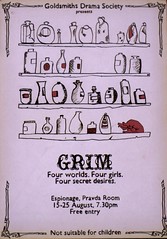
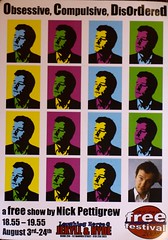
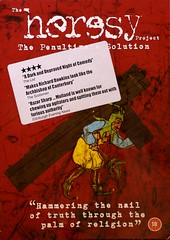
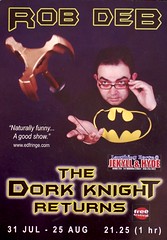
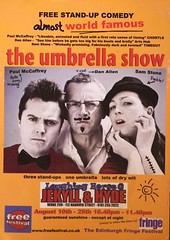
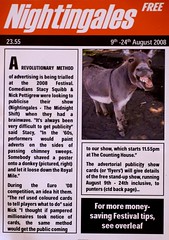
Comments